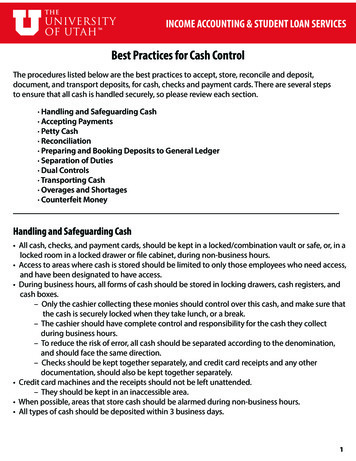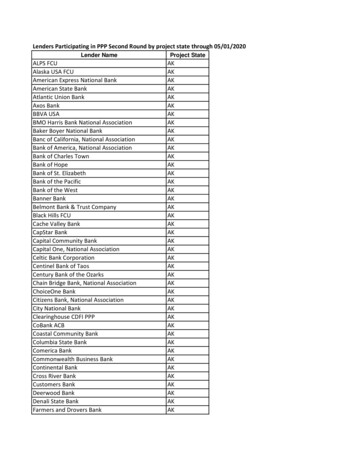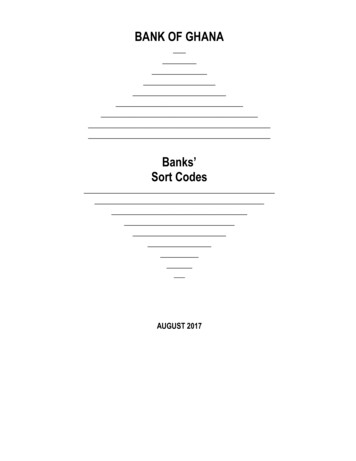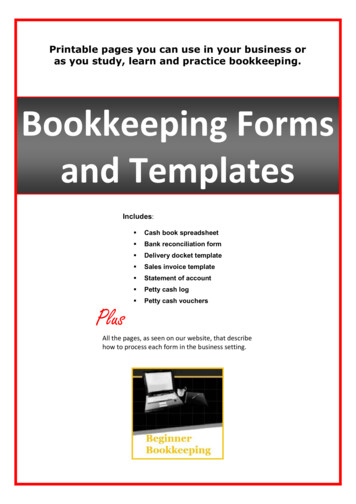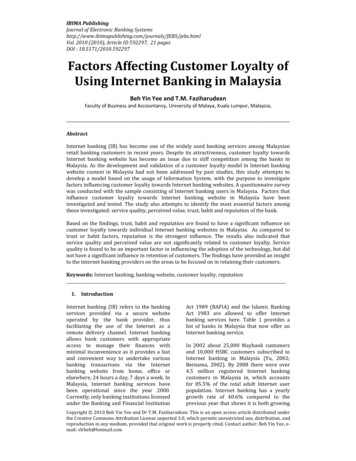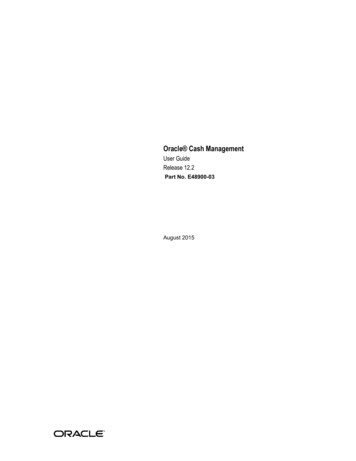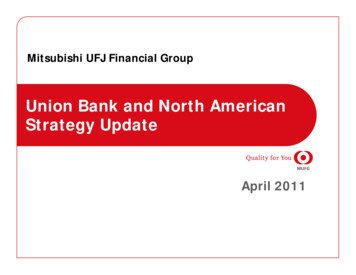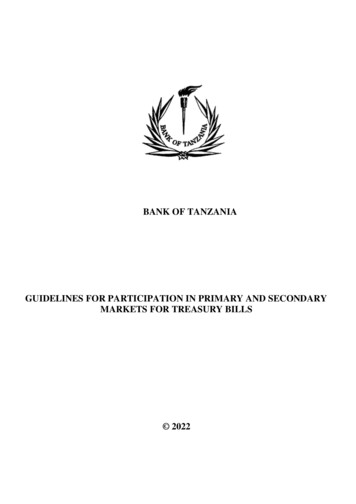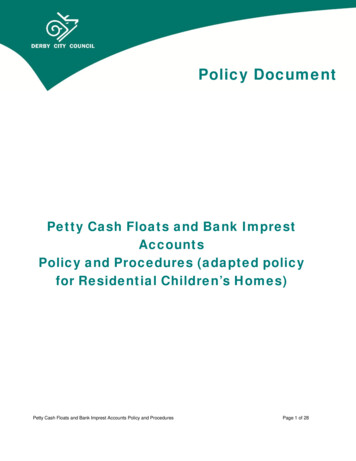
Transcription
Policy DocumentPetty Cash Floats and Bank ImprestAccountsPolicy and Procedures (adapted policyfor Residential Children’s Homes)Petty Cash Floats and Bank Imprest Accounts Policy and ProceduresPage 1 of 28
Document AssuranceDocument DetailsFile Ref:Petty CashAuthor:Janet Bowlzer/Janice HadfieldTitle:Petty Cash Floats and Bank ImprestAccounts Policy and ProceduresVersion No:Draft 5.0Reviewed by:Petty Cash Review GroupDate of Issue:Dec 10Review period:Policy to be reviewed by board in January2011Approved by:Revision to include clarity for ResidentialReviewed by Control Board December 2014Children’s home following ResidentialChildren’s home internal audit Aug 2014File name and location of control document:I/Finance/Petty Cash/Draft petty cash imprest policy/File: Master Petty Cash Policy draft v6.0Document Version ControlVersion DateName and Role1.020.8.10Janet BowlzerDescriptionFirst Draft2.010.09.10Janet Bowlzer3.021.10.10Janet Bowlzer4.009.11.10Janet BowlzerFourth Draft to implementappendices, APIG comments, indexand flow charts5.010.12.10Janet Bowlzer21 01 11Janet BowlzerAug- Dec2014Janet Bowlzer –Rod JonesFifth draft to tidy up, re-arrangeappendices and insert flow chartsSign amendments and appendixreferAddition of points of clarificationspecific to Residential Children’sHomes following an internal auditrecomendation6.0Document CirculationNameNeale, Kate; Cale, Marcus;Second draft – Amended for initialcommentsThird DraftApprovedAmendmentsto be madeAmendmentsmadeDistributed toAPIGDistributed tocash groupand controlboardDistributed tocash groupand controlboardBoard – Dec2014RolePetty Cash Imprest Group MembersPetty Cash Floats and Bank Imprest Accounts Policy and ProceduresPage 2 of 28
Carnell, Alex; Moody, Jo;Blake, David; Robinson, Gill;Strang, Rob; tPetty Cash Floats and Bank Imprest Accounts Policy and ProceduresPage 3 of 28
Index1Introduction1.11.21.32Petty Cash Floats and Bank Imprest Accounts Policy and ProceduresPetty Cash Floats and Imprest Accounts – What are they?Flow ChartsPetty CashImprest AccountsApplication for an Account666Petty Cash floatsImprest AccountsAppropriate SpendsExemptionsCoding for Residential Children’s homes /frequent expenditure777Limits3.13.23.33.43.54Reimbursements to Employees5Controls5.15.25.35.4610101111Imprest reconciliationOverdrawn accountsPetty Cash reconciliationMissing / surplus moniesReplenishment1213131314Cash and cheque securityCash and Key hersVAT receiptsLost receiptsCredit Card receipts and personal loyalty cards8Reconciliations6.16.26.36.46.57445The Setting up and Changes of Accounts.2.12.22.33Page NoYear EndSurprise cash-upsAbsenteeismConfidential Reporting code17171717Appendices12345678910Flow chart – Setting up or amending a petty cash/imprestFlow chart – Using petty cashFlow chart – Reconciling and replenishing petty cash/imprestRequest for setting up or changing petty cash floats and imprest bank accountsPetty cash voucherPetty cash float/imprest bank account record sheetExample imprest account reconciliationExample petty cash reconciliationExample replenishment formAppropriate Spends Residential Children’s Homes OnlyPetty Cash Floats and Bank Imprest Accounts Policy and Procedures181920212223242526Page 4 of 28
1.Introduction1.1 Petty Cash Floats and Bank Imprest Accounts Policy and ProceduresThe following policy is for all staff who handle petty cash and imprest accounts. This policy coversprocesses, procedures and responsibilities that are necessary when administrating petty cash and/orimprest accounts. This policy ensures secure and robust processes reducing the risk of unauthorisedaccess and the possibility of any discrepancies.Chief Officers must ensure that all managers within their departments have read and understood thispolicy and that it is complied with at all times. Furthermore, all staff involved in petty cash floats andimprest accounts should be made aware of the requirements of and have access to the Policy.Management and staff should be advised that disciplinary procedures may be taken against them ifthey fail to comply with the Policy.The Policy represents the minimum standard that must operate throughout the Council, and isdesigned to ensure compliance with Financial Procedure Rules. Managers may incorporate additionalprocedures only if they enhance the requirements of the Policy.Any occurrences of non-compliance with the policy should be reported to the Head of Internal Audit forinvestigation.When handling cash this policy must also be read in conjunction with Derby City Council’s CashHandling Policy.This Policy should also be read in conjunction with the latest Derby City Council’s FinancialRegulations paying particular attention to the section related to petty cash. This sets out theresponsibilities and financial limits which are regularly reviewed.1.2 Petty Cash Floats and Imprest Accounts – What are they?Petty CashPetty cash floats are designed to help services purchase some goods and services by cash or chequepayment (in the case of an imprest account)Petty cash floats are relatively small amounts of cash kept at hand for making immediate payments formiscellaneous small expenses. The rules and regulations surrounding such floats are strict and mustnot be contravened.These types of float are for staff use only and not available to the general public. They must not beused for staff personal use and should only be used when other forms of ordering goods is notpossible.Every time funds are needed for a small purchase money is physically taken out of petty cash (usuallyout of a locked tin in a lockable draw or safe). A petty cash voucher must be completed. In thisPetty Cash Floats and Bank Imprest Accounts Policy and ProceduresPage 5 of 28
example, you might take 10 out of petty cash when you go to the post office. When you return, youwill have a VAT receipt (remember, always get a receipt) for 3.14 and 6.86 in change. Thecombination of these two things is equal to the 10 you took out of the fund.The VAT receipt and change is put back in the tin and a record of the date, amount, and type oftransaction is recorded.Once the actual cash in the petty cash fund gets low, the float is reconciled and the funds replenishedin cash.Imprest AccountsImprest Accounts are generally required in the same way as petty cash floats and work to a similarmethod. The major difference is that a local Derby City Council bank account is used as well as cashtin; this allows cheques to be written in cases of emergency. Imprest floats are greater and thepurchases more frequent. The need for security of cash and monthly reconciliations are the same asthe petty cash float but instead of the funds being replenished in cash the bank account is depositedwith the amount being reimbursed.1.3 Flow ChartsThis policy documents contains various flowcharts to aid the user when setting up and operating pettycash/imprest accounts.Appendix 1 relates to setting up an account and amendmentsAppendix 2 relates to the using of the accountsAppendix 3 relates to reconciliations.These charts should be used as a quick reference guide in conjunction with the whole policy.Petty Cash Floats and Bank Imprest Accounts Policy and ProceduresPage 6 of 28
2. The Setting up and Changes of Petty cash floats and Imprest BankAccountsA petty cash float or imprest account must only be set up where there is a justified need for one.Before an imprest/petty cash float is set up it must be authorised by a Head of Service andcountersigned by a Principal Accountant or Group Accountant. The request must be signedand approved by the Strategic Director of Resources. (Appendix 4)2.1 Petty CashPetty cash accounts should only be used for emergencies when it is not possible to issue an officialorder for the supply of goods. Every attempt should be made to use the council’s official electronicordering system. Petty Cash floats are designed for small amounts and infrequent use.Any misuse of any account by any individual including those responsible for authorising payments mayresult in the closure of the account.2.2 Imprest AccountsImprest accounts should only be used for the agreed purposes and when it is not possible to issue anofficial order for the supply of goods. Every attempt should be made to use the official electronicorders for Derby City Council. Imprest accounts benefit from separate bank accounts and the accessto a cheque book. Floats are usually larger and use is greater than a petty cash account.Any misuse of any account by any individual including those responsible for authorising payments mayresult in the closure of the account.2.3 Application for an AccountBefore any petty cash or imprest account is set up the Head of Service must request, using the form inappendix 4, the reason why they need such a system to purchase goods. This form is then submittedto the relevant accountant.Each application will be looked at individually and assessed on need, budget available, suitablecontrols and confidence in those controls.If an account is rejected the Head of Service will be notified. Once monies are handed over to theservice area it is the responsibility of the officers involved in the day to day running of the accountalongside the Head of Service to ensure all rules and regulations are followed.Petty Cash Floats and Bank Imprest Accounts Policy and ProceduresPage 7 of 28
3 LimitsAll limits will be reviewed annually as part of the close down process, any changes must be requestedusing the form shown in (Appendix 4) Please refer to the Financial Procedure Rules for the currentmaximum limits for each transaction of spend.3.1 Petty Cash FloatsThe float limit should be agreed with the Principal Accountant/Group Accountant and the Head ofService requesting the float. The Strategic Director of Resources will have the final approval.Payment limits should reflect the limits as written down in the latest Financial Procedure Rules.3.2 Imprest AccountsThe bank account limit should be agreed with the Principal Accountant/Group Accountant and theHead of Service requesting the float. The Strategic Director of Resources will have the final approval.Payment limits should reflect the limits as written down in the latest Financial Procedure Rules.(This is usually the same limit as for Petty Cash unless an exception has been granted by theStrategic Director of Resources) – Important Note: The bank account should never be allowed tobecome overdrawn. Monthly reconciliations are necessary to evidence that the bank account is notoverdrawn.3.3 Appropriate SpendsThe appropriateness of spends relies on the integrity of the individuals using the petty cash/imprestaccounts. Individuals must be able to demonstrate that expenditure incurred was for a particular DerbyCity Council activity and more importantly could not be ordered electronically.Salaries, wages, fees and taxable expenses must NEVER be paid through petty cash or imprestaccounts. Travel expenses, parking fees and taxis/buses for staff cannot be paid through thesesystems, any type of staff expense will need to be claimed in the proper way through the travel andsubsistence system.Loans must not be made to staff or personal cheques cashed from any account.Petty Cash should not be used for the following - See appendix 10 for a list of appropriateexceptions that apply to Residential Children’s Homes only Food and Snacks for staff Celebration cards, e.g. birthday, wedding,sickness, leaving Flowers Christmas presentsPetty Cash Floats and Bank Imprest Accounts Policy and Procedures AlcoholPage 8 of 28
The following list is an example of goods that should be purchased through corporatecontracts using purchase orders and not classed as petty items. Batteries Cleaning products Stocks of Stamps – from the income andpost team Activity and trip goods (these need to beplanned in advance and ordered as presentsFor any further advice/guidance on corporate contracts please contact the procurement teamprocurement@derby.gov.uk or 643271.3.4 ExemptionsExemptions to this policy fall into two categories.1 – Exemption from procedure process/extraordinary expenditure2 – Exemption from financial limitsExemption from any procedure process/extraordinary expenditure will need to be agreed with theGroup Accountant and signed by the Strategic Director of Resources.Exemption from any financial limit stated in the policy as stated in the Contract / Financial Procedurerules will have to be agreed beforehand by cabinet. This will take the form of a cabinet report and willneed to be planned to coincide with cabinet meeting deadlines. Principal/ Group Accountants will beable to provide advice on deadlines and format of the report. Please note the process for cabinet tohear reports can be lengthy and deadlines are set in advance. If a deadline is missed the report will bedeferred to the next meeting.Any exemption may not be acted upon until approval is given.3.5 Coding Specific to Residential Children’s homes and frequent expenditureThe following subjective codes must be used when categorising frequent expenditure whenworking in a Residential Childrens HomeTravel D4001Refreshments E1512Birthday Allow F5015Toiletries E1009Outings/Visits/Activities E3002Festivity Allow F5016Pocket Money/Dinner Monies G5007Meals/Snacks E1504Holiday Allow F5014Clothing F5017Incentive F5052Less Frequent ExpenditureIt must be noted that less frequent spends such as urgent equipment, mobile top ups, birthdaycards, photos, postage, stationery, school equipment any other less frequent expenditurePetty Cash Floats and Bank Imprest Accounts Policy and ProceduresPage 9 of 28
must be firstly considered to be purchased through an official order, procurement card ortravel voucher.4 Reimbursements to employeesIt is necessary for all requests for reimbursements to be thoroughly checked. In the first instance theofficer responsible for reimbursement must check that all receipts comply with this policy ensuringitems of expenditure are appropriate and VAT is correctly calculated and claimed.Each transaction should be recorded using petty cash record sheet (example in appendix 6); this canbe a simple spreadsheet that records transactions and details amounts purchased.VAT receipts should be cancelled or drawn through (single red line) once reimbursements have beenmade – however the receipt still needs to be legible.The process for issuing petty cash is shown in the flowchart (appendix 2)In exceptional circumstances where it is not possible to obtain money in advance then approval mustbe sought from the budget holder.Petty Cash Floats and Bank Imprest Accounts Policy and ProceduresPage 10 of 28
5 Controls5.1 Vouchers – applicable to both petty cash and imprest accountsPre numbered vouchers are confirmation slips that records the purchase of the goods and totalreimbursed. See templates in appendix 5. Vouchers must be pre numbered. Use of any othertemplate must be approved.A voucher must be completed when money is first taken for all items of expenditure being claimed.Each person claiming from the petty cash or Imprest account will have to sign a voucher.Vouchers should clearly state the following information Description of goodsDate of purchaseAmount (figures and in words) of money initially takenAmount (figures and in words) of money returned – and corresponding receipt.Reason for PurchaseSignature and name of employee claiming reimbursementSignature and name of nominated petty cash officerCost code to the correct budget codeReceipts must be attached to all vouchersSignature of authorising officer.ALL receipts and money due for return must be returned the next working day and the pettycash voucher updated with actual spend. If goods purchased differ from the original request,this must be brought to the approvers’ attention.All expenditure must be recorded at the time it is incurred on the petty cash record sheet.5.2VAT Receipts – applicable to both petty cash and imprest accounts.For any expenditure to be verified and reimbursed there needs to be evidence of theexpenditure incurred. Evidence must always be an official document from the supplier– an example would be a VAT receipt.VAT Receipts are needed for: Accountability – Each employee is accountable for the ‘public money’ that they spend andobtaining receipts evidences the purchases made and protects staff from accusations of anymisuse of funds. Budget Monitoring – A receipt also helps to ensure purchases are allocated to the correctbudget heading.VAT Receipts must be obtained for all items exceeding 0.50 and should be attached to the claim forreimbursement.VAT Receipts must NEVER be split to make the value of individual items under the petty cash orimprest limit or to make items comply with the above regulation regarding 0.50. For example if thepetty cash limit for reimbursement was 50 and a member of staff purchased goods for the total of 60,Petty Cash Floats and Bank Imprest Accounts Policy and ProceduresPage 11 of 28
they must not ask for two 30 receipts or split items themselves at a checkout. Receipts are dated andtimed and these will be checked by the officers reimbursing the requests.The Council can reclaim the VAT that it pays, provided authentic VAT invoices or receipts have beenobtained. Cash float holders should ensure that, when expenditure from the petty cash / imprestaccount has been incurred that includes VAT; supporting invoices/till receipts show the followinginformation: Name, address and VAT number of the supplier;Time of supply (i.e. date);A description of the goods;The amount payable.NEVER cut receipts with scissors or stick onto a claim sheet if the receipt is double sided. The wholereceipt needs to be visible.All VAT queries should be directed to Derby City Council’s Taxation Manager within the ResourcesDirectorate.5.3 Lost ReceiptsThere will be rare occasions where a receipt is lost or unobtainable. In these instances indicate on thevoucher that the receipt is lost/unobtainable this then needs to be individually signed by the Budgetmanager. This will be monitored and frequent occurrence may result in the closure of the account.5.4 Credit Card Receipts and Personal Loyalty CardsPayment must not be made using credit cards.Employees must not use a loyalty card where points or rewards can be gained for business purchases– these are deemed a benefit in kind and would need to be declared for tax purposes.Petty Cash Floats and Bank Imprest Accounts Policy and ProceduresPage 12 of 28
6. Reconciliations and replenishmentsThe financial regulations state that “all employees operating a imprest/petty cash accountshould be able to produce upon demand to the Strategic Director of Resources cash and allvouchers to the total value of the imprest amount” the word imprest here includes all pettycash floats.ALL RECONCILIATIONS SHOULD BE CHECKED AND COUNTERSIGNED BY A PERSON NOTINVOLVED IN THE DAY TO DAY OPERATION OF THE ACCOUNT BEFORE THERECONCILIATION IS PRESENTED FOR REPLENISHMENT. Reconcile monthly and prior to replenishment. It is important that reconciliations are performed before any reimbursement is submitted When a bank statement is received for the imprest account, the balance shown on thestatement must be reconciled to the claims.Irrespective of how often the cash is replenished, all petty cash and imprest accounts should bereconciled and balanced to either the float total (petty cash) or bank statement (imprest account) atleast monthly; reconciliation sheets need to be signed and retained by the petty cash/imprest holder.Quick Reconciliation checkTotal amount of expenditure being reclaimed( ) plus cash( ) plus any claims not reimbursed,( ) plus the balance at the bank (if held)Equals ( ) Initial Float6.1 Imprest Reconciliation – appendix 3 and appendix 7Bank statements should be requested monthly if you have an imprest account All cheques issued during the period must be checked against the statement, using thecounterfoils from the cheque book. Cheques presented should be ticked off on the statement,and ticked on the counterfoil in the cheque book. Any cheques not presented but issued must be deducted from the balance on the currentstatement. Any reimbursements not credited to the account must be included in the final ‘balance at bank’figure.Petty Cash Floats and Bank Imprest Accounts Policy and ProceduresPage 13 of 28
All calculations must be clearly written on the bank statement to prove the reconciliation for theperiod. Using the ‘Bank Reconciliation’ box on the imprest reimbursement form, enter the details fromthe bank statement as the following example:Appendix 7 is an example of how to reconcile an account using the DCC template.6.2 Overdrawn AccountsUnder no circumstances should a bank balance become overdrawn. Any overdrawn accounts shouldbe noted immediately to the Principal/Group accountant. A decision will then be made as to whether ornot the imprest account can remain open.*In the case of Residential Children’s home only any misuse of the account by any individual includingthose responsible for authorising payments, will be reported to the Service Director responsible for thehome for investigation and action.6.3 Petty Cash Reconciliation appendix 3 and appendix 8All vouchers reimbursed need to be totalled. Cash remaining in the tin or safe also needs to betotalled. The combined total of cash and vouchers should balance to the initial float.All items of expenditure need to be recorded on the claim sheet with the VAT clearly marked for vatpurchases. Cash left in the tin must be counted and entered as ‘Cash in Hand’ on the claim form.Periodic checks will be performed by independent members of staff to ensure cash in hand is a truefigure. See surprise cash ups.Appendix 8 is an example of how to reconcile an account using the DCC template6.4 Missing / Surplus MoniesAny missing monies need to be reported to the Principal/Group accountant immediately. The missingamount needs to be recorded on the claim sheet against a code reference for missing money. Regularoccurrences of monies missing will result in the petty cash being withdrawn. Under no circumstancesshould a member of staff ‘make up’ shortfalls to balance accounts.Any monies found to be surplus must also be recorded on the claim sheet against a code reference.*In the case of Residential Children’s home only any misuse of the account by any individual includingthose responsible for authorising payments, will be reported to the Service Director responsible for thehome for investigation and action.Petty Cash Floats and Bank Imprest Accounts Policy and ProceduresPage 14 of 28
6.5 Replenishment (top up of float) appendix 9The Head of Service or authorising officer must also be satisfied that the claim complies with this policyand the Principal/Group Accountant will also check for compliance.All reimbursement claims should be submitted to your Finance support officer within five working daysat the close of the month. Any variations to the timetable need to be documented and kept on file withthe account, along with the approval of the responsible accountant.Imprest bank account claims and petty cash claims must be sent in each month to the finance section.It is important there is clear evidence of a monthly reconciliation completed by the imprest/petty cashofficer.Petty Cash Floats and Bank Imprest Accounts Policy and ProceduresPage 15 of 28
7 Security7.1 Cash and Cheque SecurityBoth petty cash and imprest accounts will have cash available for purchases, petty cash will have acash float and some imprest accounts will have cash from cashed cheques.It is important to read the cash handling policy to ensure compliance with cash movements andsecurity. This policy is more detailed than the overview below.Cash in hand must be securely locked in a safe or cabinet at all time and the payments and recordkeeping limited to one or two officers.Cheque books must be used in order and kept in a safe. A list of cheque books must be kept at thelocation.There are two permitted options for the secure keeping of cash, depending on amounts of cash held: A safe,A locked cash tin in a locked drawer / similar secure locationAll safes need to be authorised by Derby City Council’s Insurance Section. Each safe will be given aninsurance limit, dependent on the actual type of safe in use. If you are not sure whether your safe fallsinto an acceptable category, then please contact the insurance section, Resources Directorate.If you do not have a safe, then there will be a maximum amount that can be kept in a locked cash tin,this needs to be verified by the insurance section.A set of keys should be allocated to two officers only as follows:Primary Key Holder - has overall responsibility for the day to day security of money held within theSection.Secondary Key Holder – should be consulted during periods of holiday and general absenteeism toensure that continuity of security is maintained.Any loss of keys must be reported immediately to the insurance section. The insurance section willthen inform Internal Audit and the relevant Head of Service.Both officers will ensure continuity of security by ensuring that, as a key holder, each set of keys ispermanently secured on their person, to prevent unauthorised access. All keys must be removed fromthe premises overnight.If keys are transferred between staff, a key transfer register should be completed to ensure a record ismaintained of where keys are allocated. Part of the key transfer process is to record the cash in thetin.Note: The Authority's insurance cover may be invalidated if the authority fails to ensure correctsecurity measures.Petty Cash Floats and Bank Imprest Accounts Policy and ProceduresPage 16 of 28
7.2Cash and Key HandoverIf keys are transferred between staff, a key transfer register should be completed to ensure a record ismaintained of where keys are allocated. Part of the key transfer process is to record the cash in the tinat the time of transfer.Petty Cash Floats and Bank Imprest Accounts Policy and ProceduresPage 17 of 28
8.Other8.1 Year End – Responsibilities of account holders.It is a council requirement to provide external audit with an assurance that we comply with therequirement to evidence check all accounts at the end of the financial year. The financial regulationsstate that employees operating an imprest/petty cash account must provide the Corporate Director ofResources and Housing with a certificate of the value of the account held at 31 March each year.”This is done by finance issuing certificates to all account holders who must then complete thecertificate and state the various balances at the end of the financial year, 31st March. This declarationshould be checked and countersigned by a senior officer not involved in the day to day operation of theaccount. It must then be returned to finance by a prearranged date. Any certificates not returned willresult in the closure of the account and any floats assumed missing.See Appendix 7&88.2 Surprise Cash-UpsIn order to reduce the risk that cash received may not be accurately or appropriately accounted for aSenior Officer will, on a six monthly basis, undertake a surprise cash-up of cash and cheques toensure they reconcile with the Cash Summary Sheet.1. Remove Receipt Book and Cash Summary Sheet from secure location2. With the exception of any ‘float’, ensure all money, cash, cheques and vouchers held reconcilewith the Cash Summary Sheet.3. Enter comments in box indicated as ‘Notes on Surprise Cash-up’ on the Cash Summary Sheet.If issues are identified during the surprise cash-ups, or there is insufficient segregation of duties, theseshould be carried out more regularly.8.3 AbsenteeismDuring holiday periods and general absenteeism clear segregation of duties must be maintained. Asenior officer linked to the petty cash/imprest account must nominate a replacement to undertake thecash receiving duties.During such periods the senior officer will take full responsibility for the preparation of money forbanking.8.4 Confidential Reporting Code (Whistle-Blowing)If anyone suspects any fraudulent activity or misuse of either a petty cash or imprest account they canraise their suspicions with Internal Audit or alternatively follow the Derby City Council’s whistle-blowingpolicy. Any such instances will be treated confidential and anonymously, the integrity of staff isparamount when dealing with public funds.Petty Cash Floats and Bank Imprest Accounts Policy and ProceduresPage 18 of 28
9. APPENDICESAppendix 1Petty Cash Floats and Bank Imprest Accounts Policy and ProceduresPage 19 of 28
Appendix 2Using Petty CashPetty Casll is not ----'Ye s----4. approp iate Placean oracle order10--Request !hat theupplier isset-upin OradeComplete PettyGash RequestVoucherSigned byAuthorising OfficerNominated Petty Cash Account Holdetcompletes voucher details and issues cash.Employee signs for cash receivedEmployee purchases goods and obtainsVATreoelptEmployee provides VAT receipt and change Wrequired to Nominated Petty Cash AccountHolder by next working dayVoucher Is completed,VAT receiptattached and s1ored securely with PettyCashCo1npletePetty Cash Record Sheet withdetails Ensure Voucher & reooipt ateclearty drawn lh ough"Petty Cash Floats and Bank Imprest .Accounts Policy and ProceduresDraft Version 5.0 December 2010Page 20 of 28
Appendix 3Petty Cash Floats and Bank Imprest Accounts Policy and ProceduresDraft Version 5.0 December 2010Page 21 of 28
Appendix 4Request for Setting up or changing Pettycash floats/ Imprest bank accountsA petty cash float or imprest account must only be set up where there is a justified need for one. Before animprest/petty cash float is set up it must be authori
Before an imprest/petty cash float is set up it must be authorised by a Head of Service and countersigned by a Principal Accountant or Group Accountant. The request must be signed and approved by the Strategic Director of Resources. (Appendix 4) Petty cash accounts should only be used for emergencies when it is not possible to issue an official
